Introduction: In this article, Melissa Davenport Berry gives news clippings and photos from a scrapbook showing an earlier way of life. Melissa is a genealogist who has a website, americana-archives.com, and a Facebook group, New England Family Genealogy and History.
A scrapbook created by the Village Hall Association of Annisquam, a waterfront village in the city of Gloucester, Massachusetts, reveals a rich and colorful history.
This precious relic is at the Annisquam Historical Society (AHS).
A newspaper photograph in the scrapbook featured two veteran granite cutters from Annisquam. This snapshot was taken for an article written by John F. Coggswell in 1930.
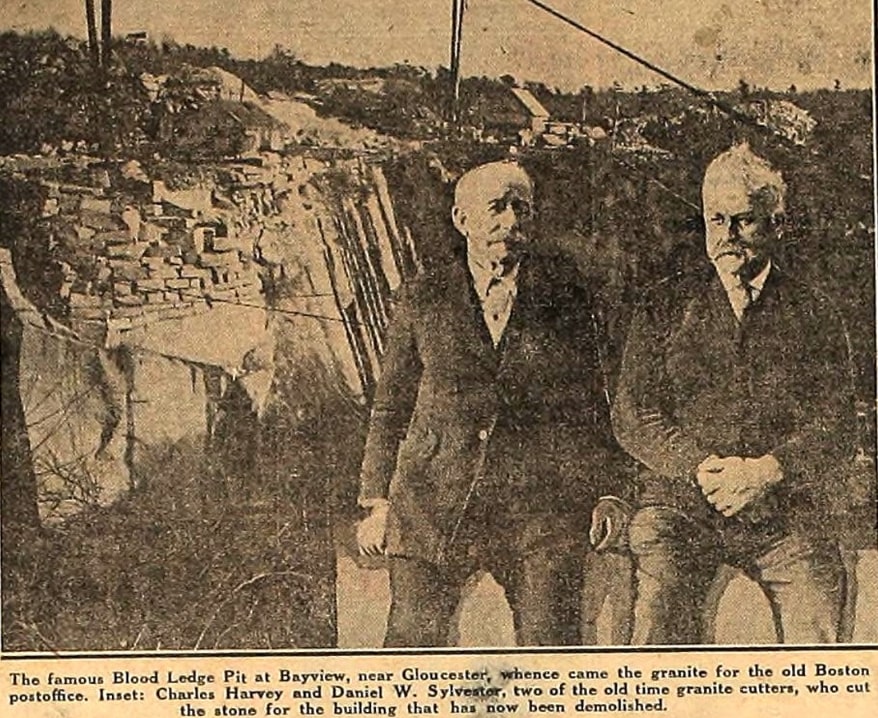
The photo caption reads:
The famous Blood Ledge Pit at Bayview, near Gloucester, whence came the granite for the old Boston Post Office. Inset: Charles Harvey and Daniel W. Sylvester, two of the old time granite cutters, who cut the stone for the building that has now been demolished.
Subjects’ Background
Charles Albert Harvey (1859-1950) was born to Warren A. Harvey and Lydia Ann Daggett. He married Caroline Sargeant Chard, daughter of William Dennison Chard and Caroline Lane Dennen. The couple had a son, Gilman Clifton Harvey Sr., who married Helen May Parsons and left descendants.
Daniel Webster “Web” Sylvester (1852-1932) was born to Samuel Sylvester and Eliza Ann Rowe. He married Annie M. Rowe, daughter of Captain William Henry Rowe and Charlotte Webb. They had one daughter, Minnie Sylvester, who married William Everett Blanchard and left descendants.
Granite Quarry & Old Boston Post Office
The two stonecutters reminisced in 1930 with reporter Coggswell about their experiences working in the quarries. Sylvester was 77 years old and Harvey was 71 at that time.
The two men were disturbed by the recent demolition of the Boston Post Office in October 1929. They, along with other “rock-hard men,” were proud of their contribution to the federal edifice.
Sylvester said:
“What I can’t understand is how they ever came to condemn and tear the best building that man ever built. It was good honest rock. It works well and stands up in any weather and holds its color… From the very heart of Blood Ledge, in the Rockport Granite Company’s quarry of Bayview, were cut the huge sills that supported the old post office – 50,000 pounds apiece they weighed, and it took 20 yoke oxen to drag them to the dock.”
I found an image of the early construction.
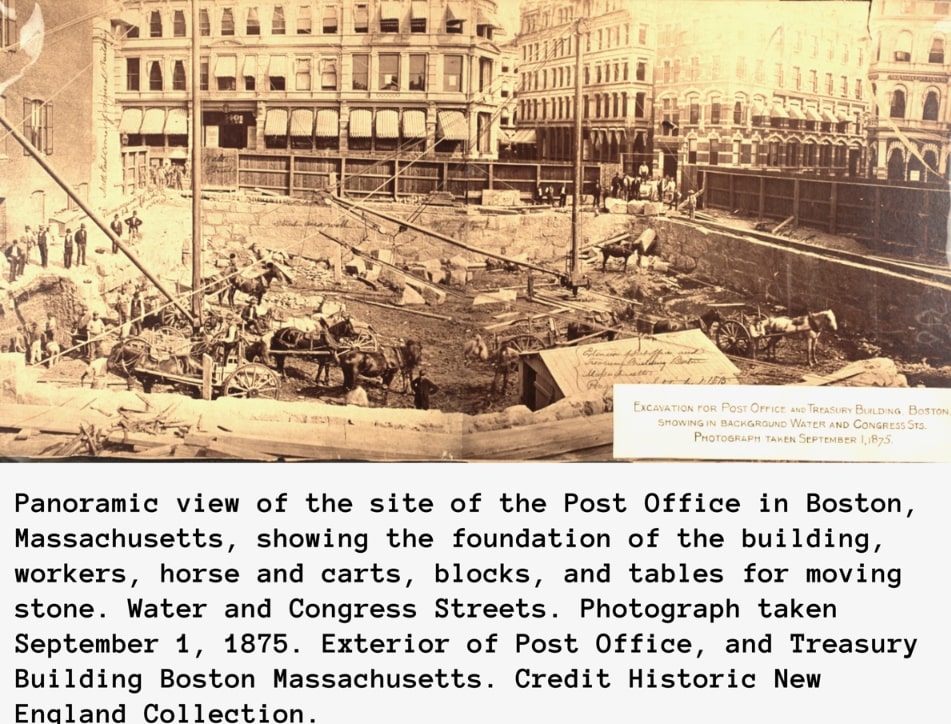
During that time Sylvester worked 10 hours every day, except on Sundays and Washington’s Birthday, and drew in $27.50 for his monthly pay.
Harvey was a bit younger than Sylvester. Here is his story:
When the extension was put on to the Old Boston Post Office a few years later Harvey was old enough to work. Sylvester was working in Baltimore with other stonecutters from the village, so this gave way for opportunity for new blood.
“They gave 24 of us youngsters a chance to learn the business as apprentices. There was Ned and Jack Tobin, George Mackenzie, Tom Ferguson, Sam Jones, and Bill Sleep… the rest I cannot remember. Our folks had to put up a $200 bond for each of us, that we’d serve our full two-year apprenticeship. We got 75 cents a day for the first year and $1.25 for the second… It was on June 25, 1878, we started cutting stone for the extension. And we were finally granite cutters by the time we finished the job. All kinds of stonecutters on that job.”
Sylvester piped in and said “Charley’s right, there were all kinds of nationalities – Welshmen, Scotchmen, Englishmen, Swedes, Spaniards, and Italians.”
This photograph of an ox team carting a large granite stone also appears in the Coggswell article in the scrapbook.
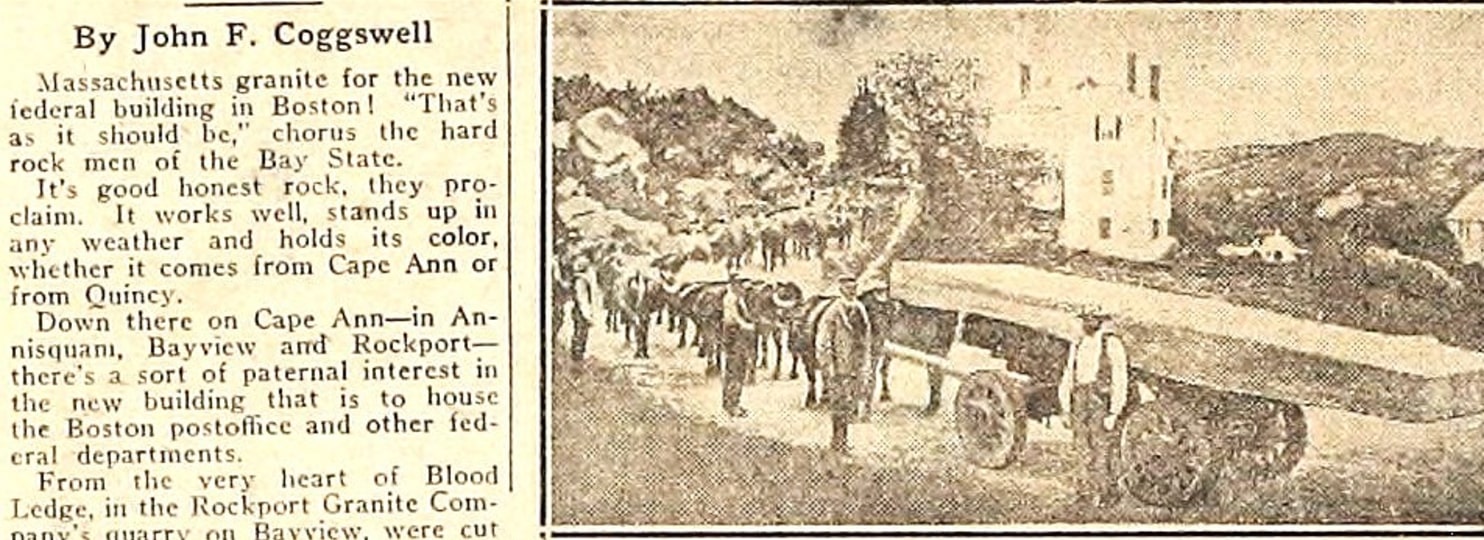
I found a newspaper clip that describes a scene similar to the photo above, as well as another clip reminding us of how dangerous this work could be.
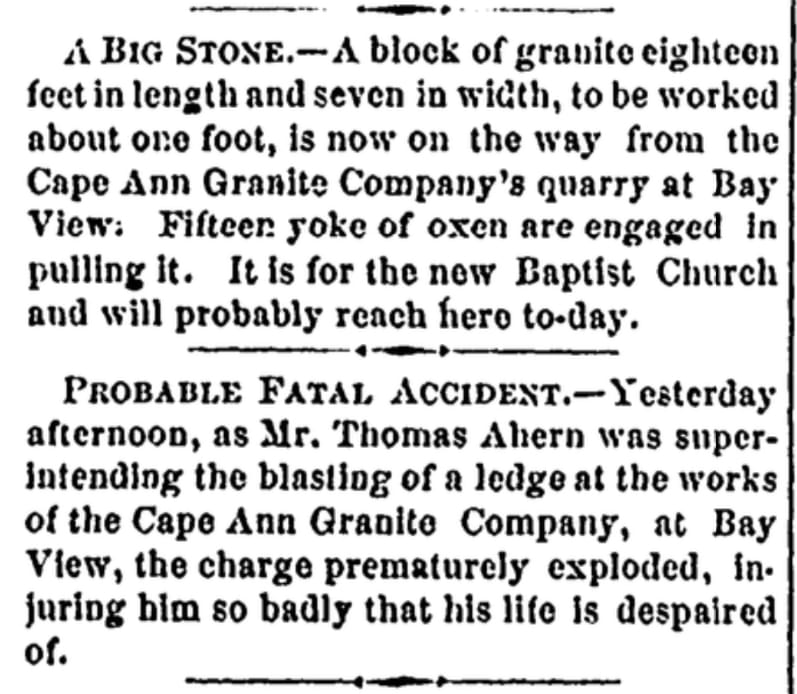
Stonecutting Was Not the Only Trade for These Two Chaps
An obituary published in the Boston Herald for Charles A. Harvey, who died at age 91, stated he was the “last of the old New England stagecoach drivers.”
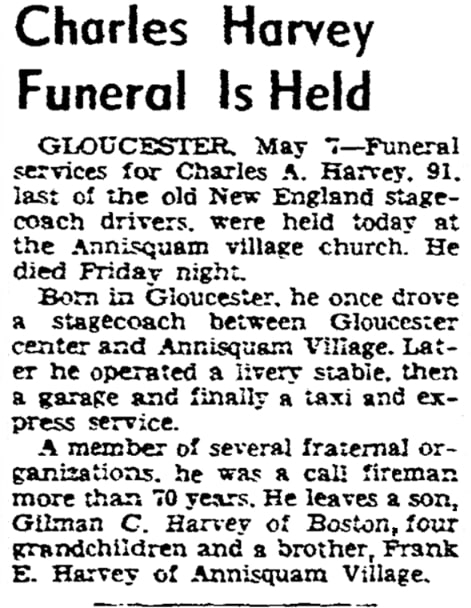
Skipping over his early years, when in the strength of youth he was a stonecutter, this obituary details Harvey’s work in his later years:
Born in Gloucester, he once drove a stagecoach between Gloucester center and Annisquam Village. Later he operated a livery stable, then a garage, and finally a taxi and express service.
Additionally, Harvey was an on-call firefighter for more than 70 years.
Here are two photos of Harvey’s enterprises shared by a descendant. The first is Harvey in his career as a stagecoach driver.
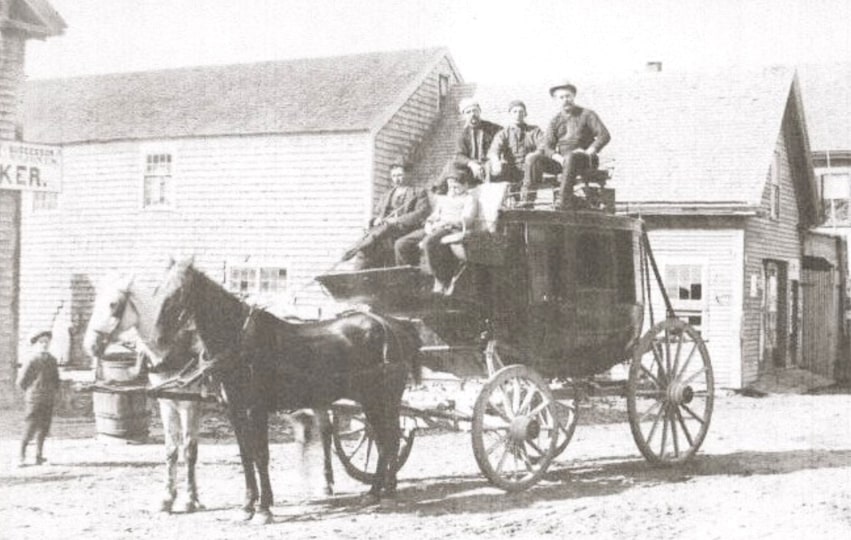
This next photo shows Harvey in his trucking business.
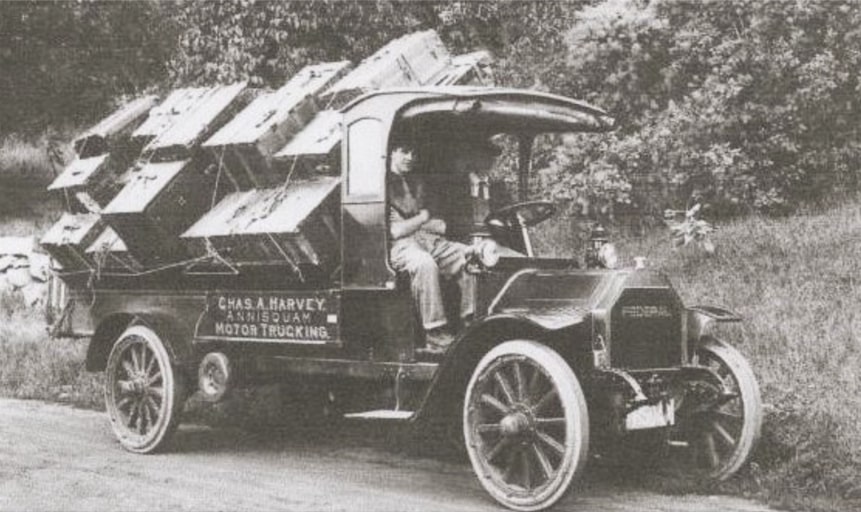
In his later years, Daniel “Web” Sylvester also had other jobs. He owned and operated the Overlook Hotel, located on the highest land in Annisquam.
The hotel was built in 1895 by H. P. Boutelle of Dorchester. Sylvester managed it. In 1900 he purchased the business and put on a large addition, giving the hotel 100 rooms.
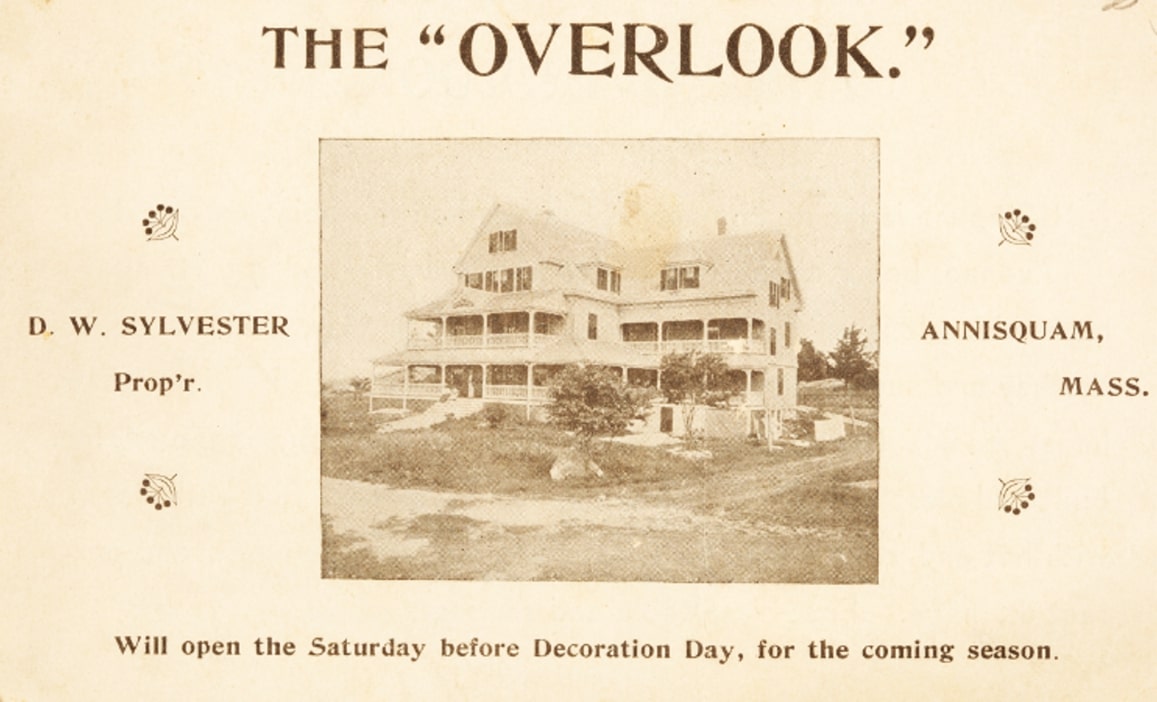
In the later part of the 1920s the hotel suffered financial losses due to the crash. A letter dated 8 April 1928 from W. E. B. Du Bois to Sylvester survives, suggesting he advertise the Overlook in the Crisis to draw in customers.
The hotel was severely damaged by fire on 7 January 1929. Sylvester died on 20 February 1932.
Explore over 330 years of newspapers and historical records in GenealogyBank. Discover your family story! Start a 7-Day Free Trial
Note on the header image: ox team hauling granite slab on Washington Street, Annisquam, Massachusetts. Colonel Jonas French is standing second to the right. According to sources, Elizabeth Blood, widow of Joseph Blood, sold the quarry and lands to Col. French for the sum of $2,500. Credit: Annisquam Historical Society.
